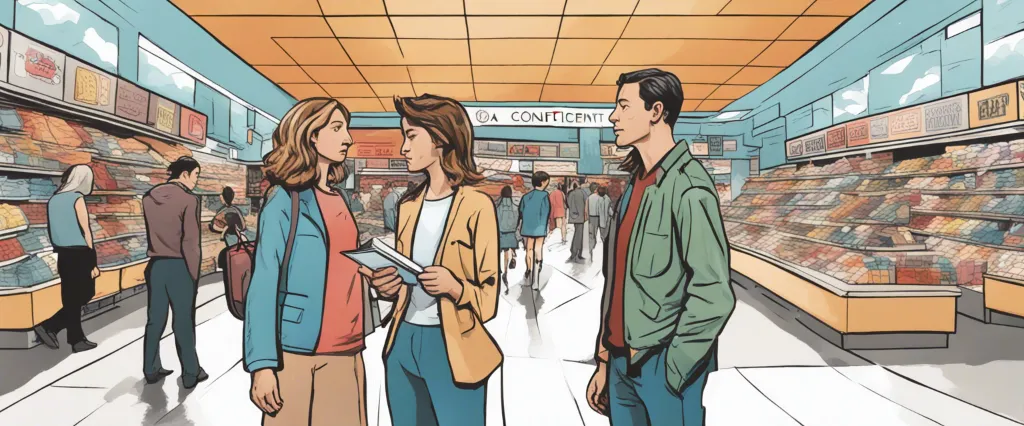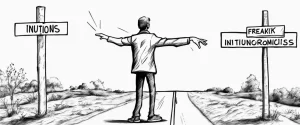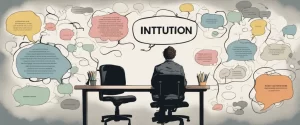
In a world where countless options greet us at every turn, making decisions can often become overwhelming. As human beings, we strive for autonomy and the freedom to choose, yet we find ourselves constantly questioning those choices and grappling with the consequences. But what if our decisions were not as rational as we believed them to be? What if our preferences were susceptible to biases and our behavior driven by unconscious forces?
In exploring the intricate workings of human decision-making, two prominent social scientists, Barry Schwartz and Dan Ariely, delve into the paradoxes and irrationalities that underlie our choices. Their respective works, “The Paradox of Choice” by Schwartz and “Predictably Irrational” by Ariely, delve into the fascinating realm of psychology, shedding light on the complex relationship between choice, rationality, and happiness.
Barry Schwartz, a renowned psychologist and professor, takes a critical look at the ever-expanding assortment of options available to us in “The Paradox of Choice.” He posits that while freedom of choice is valued in society, an abundance of options can lead to decision paralysis and a decline in our overall satisfaction with the choices we make. Through thought-provoking anecdotes, empirical evidence, and engaging analysis, Schwartz challenges our preconceived notions about choice and proposes strategies for finding balance amidst an excess of options.
On the other hand, Dan Ariely, an influential behavioral economist and professor, navigates the quirks and biases that shape our decisions in “Predictably Irrational.” Ariely argues that our choices often deviate from the rational route due to our deeply ingrained cognitive biases, emotional responses, and social influences. Drawing from captivating experiments and real-life scenarios, he explores the hidden, irrational forces that dictate our decision-making processes while offering insights into how we can better understand and counteract these tendencies.
While both books share a common interest in the human decision-making process and its inherent flaws, Schwartz and Ariely approach the subject from distinct perspectives, employing different methodologies and drawing from varied disciplines. The Paradox of Choice” focuses on the psychological aspect of decision-making, exploring how the overwhelming abundance of options affects our mindset, while “Predictably Irrational” examines the behavioral economics perspective, dissecting the biases and irrational tendencies that govern our choices.
In this comparative study, we aim to explore the convergences and divergences in the arguments put forth by Schwartz and Ariely. By delving into their respective theories, methodologies, and empirical evidence, we seek to unravel the nuanced layers of human decision-making and develop a comprehensive understanding of the paradoxical nature of our choices. Ultimately, this study aims to provide valuable insights into how we can navigate the complexities of decision-making to lead more fulfilling lives in an ever-expanding sea of options.
Brief Summary of Two Books
The Paradox of Choice by Barry Schwartz
“The Paradox of Choice: Why More Is Less” by Barry Schwartz explores the impact of the abundance of choices in our daily lives. Schwartz argues that while having options seems desirable, too many choices can lead to increased anxiety, indecision, and dissatisfaction.
The book highlights the downside of choice overload, discussing how the endless array of choices in today’s consumer society can overwhelm individuals, making it difficult to make decisions. Schwartz presents research findings from psychology and behavioral economics, demonstrating how the abundance of choices can lead to reduced well-being instead of increased happiness.
Schwartz suggests that excessive choices can reduce the quality of our decisions, as we tend to become more concerned with making the optimal choice and fear making mistakes. He also explores how choice overload affects various aspects of life, including career decisions, relationships, and even self-identity.
The author proposes strategies to navigate the paradox of choice, suggesting that individuals should embrace “good enough” decision-making, learn to accept trade-offs, and focus on what truly matters to avoid paralysis by analysis. Schwartz posits that limiting choices in certain situations can actually improve decision-making and overall satisfaction.
In conclusion, “The Paradox of Choice” challenges the prevailing notion that more choices mean greater freedom and happiness. It emphasizes the importance of being mindful of the impact of choices on one’s well-being and provides practical insights into managing the overwhelming array of options in today’s world.
Predictably Irrational by Dan Ariely
Predictably Irrational by Dan Ariely is a captivating exploration into the realm of behavioral economics. Ariely, a renowned psychologist, brings together various intriguing experiments and research studies to uncover the irrational behaviors that drive our decision-making processes.
Ariely starts by challenging the traditional assumption of economists that humans are always rational. He demonstrates how our decision-making is actually influenced by a wide range of psychological factors, often resulting in irrational choices. Throughout the book, he explores numerous examples such as why people cheat, the power of price perception, the role of social norms in our actions, and the concept of relativity in decision-making.
One concept Ariely investigates is the idea of “anchoring.” He presents studies that show how an initial piece of information, even if arbitrary, can significantly impact subsequent decisions. For instance, he explores how retailers use the strategy of setting high original prices, which then anchor our perception of value and lead us to believe that we are getting a good deal when a product is later discounted.
Another key theme Ariely covers is the concept of “decision paralysis.” He demonstrates that having too many choices often leads to a sense of overwhelm and, paradoxically, dissatisfaction with our final decision. Through experiments, he reveals that people tend to prefer limited options as it makes decision-making easier and more satisfying.
Furthermore, Ariely examines the role of social norms in our behavior. He discusses how we are strongly influenced by what others around us are doing, even when their actions may seem irrational. He provides examples such as people stealing small items but condemning larger thefts or individuals conforming to social norms such as tipping in restaurants.
Throughout the book, Ariely presents thought-provoking insights into the irrationality of our decision-making processes, challenging traditional economic theories. He offers practical advice on how to understand and potentially overcome our own irrational behaviors, suggesting ways to design systems and environments that can lead to more positive outcomes.
In conclusion, Predictably Irrational is a fascinating journey through the irrational aspects of human decision-making. By employing relatable examples and engaging experiments, Dan Ariely uncovers the surprising patterns and biases that shape our choices, encouraging readers to rethink their assumptions about human rationality.
Comparison between Two Books

Similarities in Decision Making
The Paradox of Choice by Barry Schwartz and Predictably Irrational by Dan Ariely explore the concepts of decision making and highlight certain similarities in their perspectives.
1. Influence of external factors: Both books emphasize how external factors play a significant role in shaping our decision-making processes. They argue that our choices are heavily influenced by societal norms, marketing strategies, and the presentation of options.
2. Emotional biases: Schwartz and Ariely discuss the presence of emotional biases in decision making. They explain how our emotions, such as fear, excitement, or desire, can cloud our judgment and lead us to make irrational choices. Both authors encourage readers to be aware of these biases and seek strategies to mitigate their impact.
3. The effect of too many options: Schwartz’s Paradox of Choice and Ariely’s Predictably Irrational both explore the negative consequences of having too many options. They argue that an overwhelming number of choices can lead to decision paralysis, dissatisfaction, regret, and increased expectation of finding the “perfect” option. Both authors suggest that limiting options can actually lead to more satisfying decision outcomes.
4. The role of personal values: Both authors emphasize the importance of aligning our choices with our personal values. Schwartz and Ariely argue that understanding our core values enables us to make decisions that bring us long-term happiness and fulfillment. They encourage readers to reflect on their values and use them as guiding principles in decision making.
5. The impact of social context: Schwartz and Ariely acknowledge the impact of social context on decision making. They discuss how our choices are influenced by the behavior and opinions of others, as well as social norms and expectations. Both authors urge readers to critically assess the influence of social context and make decisions that align with their individual needs and goals.
While these books highlight some similarities in the field of decision making, it is important to note that each author brings their unique perspective, research, and anecdotes to the table. Therefore, readers may encounter distinct insights and approaches to decision making in each book.
Divergences in Decision Making
Both “The Paradox of Choice” by Barry Schwartz and “Predictably Irrational” by Dan Ariely delve into the realm of decision-making, pointing out the flaws and biases that influence our choices. However, the two books diverge in their approaches and perspectives.
One major divergence lies in the core focus of each book. “The Paradox of Choice” primarily emphasizes the abundance of choices available to individuals in modern consumer society and how it can lead to decision paralysis and dissatisfaction. Schwartz argues that while choice is a fundamental aspect of freedom, excessive choice frequently overwhelms and hampers our decision-making abilities.
On the other hand, “Predictably Irrational” focuses on uncovering the hidden forces that shape our decisions. Ariely explores various cognitive biases and irrational behaviors, demonstrating that humans often make choices that defy rational economic models. His research delves into the underlying psychological factors that govern our decision-making processes, shedding light on why we repeatedly fall into patterns of irrationality.
Another divergence between the books is their respective emphasis on the external and internal factors influencing decision-making. Schwartz places greater emphasis on external factors, such as the overwhelming number of choices, the advertising industry’s influence, and societal norms. He suggests that external pressures play a vital role in distorting our decision-making processes and limiting our life satisfaction.
In contrast, Ariely places more emphasis on our internal mental biases and irrational behaviors. He explores how factors like loss aversion, anchoring, and social comparison affect our choices, shining a light on the subconscious psychological forces that guide our decision-making.
Furthermore, the authors differ in their perspectives on the role of rules and standards in decision-making. Schwartz suggests that having clear rules and standards can help navigate the maze of choices and alleviate decision paralysis. He argues that setting boundaries and being satisfied with “good enough” choices can lead to increased happiness and decreased regret.
In contrast, Ariely presents a more nuanced view on rules and standards. He argues that while they can be useful, our irrational behaviors can often override them. Ariely’s research suggests that humans often make decisions based on subjective comparison and circumstances rather than objective rules, leading to unpredictability and inconsistency in our choices.
In conclusion, while both “The Paradox of Choice” and “Predictably Irrational” explore the flaws and biases of our decision-making processes, they diverge in terms of their core focus, the role of external versus internal factors, and their perspectives on rules and standards. These books provide complementary insights into the complex and often irrational nature of our decision-making.

Conclusion
Both “The Paradox of Choice” by Barry Schwartz and “Predictably Irrational” by Dan Ariely are highly regarded books that explore the ways in which our decision-making processes can be influenced. Each book offers unique insights and perspectives on human behavior and decision-making, making them valuable reads in their own right.
“The Paradox of Choice” delves into how having an abundance of options can often lead to decision paralysis and dissatisfaction. Schwartz discusses the idea that although having more choices seems beneficial, it can actually lead to anxiety and regret. The book also explores the impact consumer culture has on our decision-making and suggests strategies for dealing with choice overload.
On the other hand, “Predictably Irrational” focuses on the irrationality in our decision-making process and how we are influenced by biases and emotions. Ariely delves into various experiments and studies to highlight the predictable patterns of human behavior. The book explores topics such as pricing, self-control, and social norms, providing insights into why we make the choices we do.
Ultimately, the choice between the two books depends on your personal interests and the specific aspects of decision-making that you find most intriguing. If you are interested in the psychology behind choices and the impact of having multiple options, “The Paradox of Choice” would be a great choice. However, if you are more interested in the irrationality and psychological biases that influence our decisions, “Predictably Irrational” might be the more suitable option. Both books offer valuable perspectives and understanding of decision-making processes, so reading both would provide a well-rounded understanding of the subject matter.



